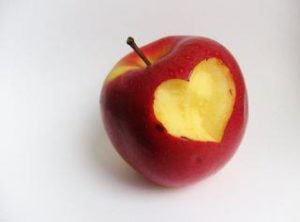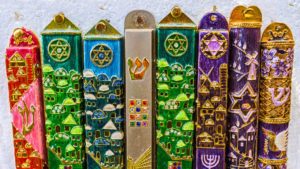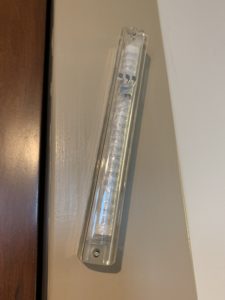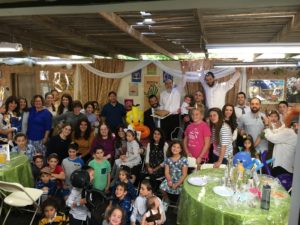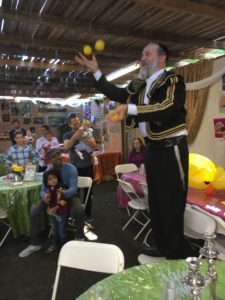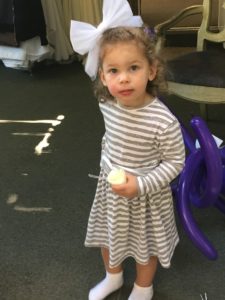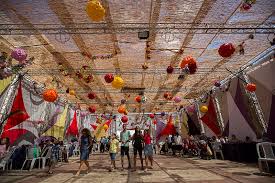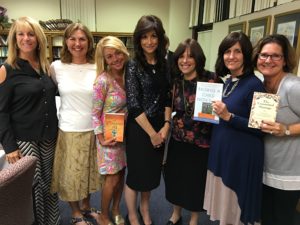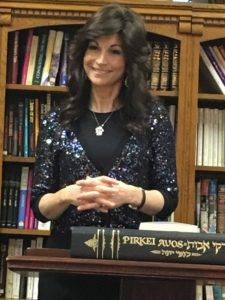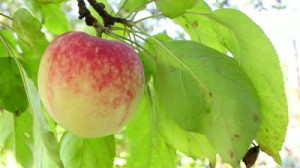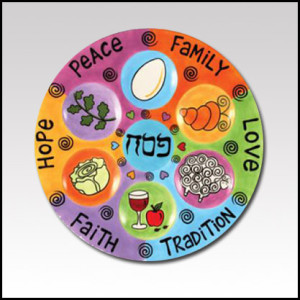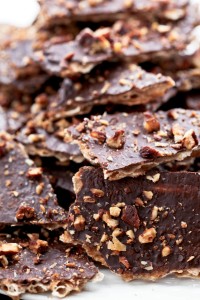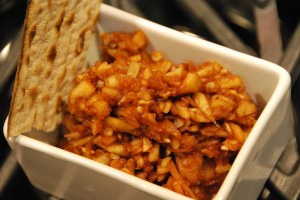Rosh Hashanah Feast Serves Up Symbolism
Jewish holidays like Rosh Hashanah are filled with rituals, tradition, and symbolism that nourish the body and the soul through food, and we’re not talking about brisket and matzo ball soup that always earn a spot on the menu.
The rich and abundant foods served on Rosh Hashanah are called simanim, which means “signs†or†indicators.†Like the special foods we eat at a Passover seder, simanim give us a taste of Jewish wisdom by directing us to improve ourselves and return to a life with more purpose and meaning. This idea of teshuva is what the High Holidays is all about, little did we know it tasted so good, with a dash of Yiddish pun.
So, let’s dig in! Continue reading
MyZuzah Wants To Bless Every Jewish Home in the World
Our homes are our castles–even more than that– our homes are our sanctuaries and the foundation of our Jewish lives.
Some of our fondest childhood memories take place in the home…lighting the Hanukkah menorah and displaying it in the window, gathering together for Shabbat, building a sukkah in our backyard are just a few ways build our Jewish identity for generations to come. Continue reading
Rosh Hashanah Mezuzzah Symbolizes New Beginnings
When I think of the High Holidays, many traditional symbols come to mind—
the sound of the shofar, an instrument made of a ram’s horn that signals the awakening of the Jewish people. The short and long blasts of the shofar—tekia, sh’varim, teruah, and tekia gedolah—summon us to come together and renew our relationship with each other, ourselves, and, of course Hashem. Crisp apples dipped in honey tempt our taste buds for a sweet new year, while we try a new fruit to symbolize gratefulness for being alive and allowing us to enjoy all the delicious fruit of the creator. A favorite fruit on this holiday is the pomegranate for its biblical significance—the Land of Israel is known for its pomegranates and is one of the “seven species†for its abundant seeds (613 to be exact) associated with fertility and good deeds, specifically the 613 mitzvot in the Torah. Here’s a good way to seed a pomegrante!
Challah is eaten all year round on Shabbat, but on the High Holidays the braided loaf is made into a round shape that represents the crown of a king for it was on Rosh Hashanah, the birthday of mankind, the sixth day of creation, that Hashem was coronated as King of the Jewish people. Another symbolic ritual during the 10 Days of Awe is tashlich, meaning “casting off†our sins of the previous year by tossing pieces of bread or another food into a natural body of flowing water. Beautiful melodic prayers such as the Armaic words of Kol Nidre, meaning “all vows,” and Avenu Malkenu, “Our Father Our King,” stir our emotions as we dig deep into our soul, asking and granting forgiveness of others and ourselves to release burdens we carry and start anew.
This year, for the first time, another Jewish symbol was added to the High Holidays for my family. The mezuzzah that we hung in my son’s new apartment on the Sunday before Rosh Hashanah. Continue reading
It’s Simchat Torah! Let’s Dance!
Ya know how when you throw an epic party and everyone comes and has a great time, and there’s always one last person to leave? It’s like the ultimate Jewish goodbye. Well that’s my analogy for Simcha Torah, and the guest of honor is God, who wants us to soak in every last bit of happiness and newfound wisdom from the weeklong festival of Sukkot. When we welcome guests into our outdoor huts and we gather together in the beauty of nature and under the stars, we are humble and grateful.  We aren’t focused on material things that separates us, but rather the simple joys that bring us together. My mouth is still watering from dipping soft chewey challah into tahini stuffed eggplant and butternut squash soup, a few of the delicacies that wet our appetites for a feast served inside the sukkah of Rabbi Yosef and Mimi David. Consideirng the meal began after sundown, when the stars appeared, it was a late nite before we said our goodbyes. As we walked down the sidewalk together, we heard the sounds of crickets chirping and the faint singing of neighbors down the street who were still rejoicing after a full day of fun in their annual Yari sukkah party with lots of children, families, balloon making, moon bounce, a juggling rabbi, and a dairy meal of pasta, quiche, and sweets that kept on coming. This feeling of joy is what we strive for when Sukkot is finally over and we move back into our homes and return to our everyday lives. We try to maintain the closeness to each other, to God, and to nature.
Sukkot Celebrates Bountiful Harvest with Family, Friends, Food & Fun
The week-long festival of Sukkot, the Hebrew word for “booths,†begins when the sun goes down tomorrow night (September 23-30), and is considered one of the happiest times in the Jewish calendar. When else are we commanded to build a hut-like structure, called a sukkah, in our backyard, decorate it with fresh fruit, gourds and other Judaica ornaments, and get to eat our meals alfresco and even sleep under roofs of branches open to the stars? Continue reading
Four Ways to Forgive, A Yom Kippur Lesson
Forgiveness. It’s the theme of Yom Kippur, and not an easy concept to swallow—kind of like that pickled herring served at break the fast.
Yom Kippur is a time for atonement between us and God. It is the most solemn (and yet positive) time in the Jewish calendar. During the High Holidays, or the 10 Days of Awe, we not only ask God for forgiveness, but also that of our fellow human beings…and ourselves. We can pretty much count on God forgiving us for our mistakes, wrongdoings, and lashon hara (talking negatively about people behind their back) because the Almighty has unconditional love for us, like a parent would of his child. Making mistakes is an inevitable part of human nature and an opportunity for self growth. Asking (and accepting) forgiveness, whether the hurt was caused intentionally or not, is a physical, tangible way to heal the soul and clean the slate for the coming New Year. And it’s not meant to be easy. For Jews, this is the time when the real homework begins. Continue reading
Three Gifts I Learned at Rosh Hashanah
Rosh Hashanah, translated in Hebrew as “head of the year,†is a time to let go. As a new Empty Nester, letting go seems to be the theme of everything these days. We let go of our mistakes from the previous year, let go of shame we may be feeling, let go of sorrow for hurting someone, and, of course, ask for their forgiveness.
The Jewish New Year is also a celebrated time for new beginnings…a new school year, a new relationship with others, a new commitment to better ourselves, and a reawakening of Judaism and the Almighty.
On 911, Their Memory Is A Blessing
As I write this story, I watch the memorial service in New York that is videotaped live on my computer and listen to family members read the names of their loved ones who died on September 11, 2001. A flute quietly plays Amazing Grace, while the crackling voices pronunciate the names of each and every name of the nearly 3,000 people who perished 12 years ago in the World Trade Center, at the Pentagon, in a grassy field in Shanksville, Pennsylvania, and in the ash-covered streets in Lower Manhattan on that infamous day from hell.
The speakers are children and adults,who stand before the crowd on a hot summer morning, with the rush of the two waterfalls in the background. They share personal stories about their mothers, fathers, husbands, wives, daughters, sons, brothers, sisters, friends who went to work on that September 11 morning and never came home.
Rosh Hashanah Sweetens The Deal
The Jewish New Year is off to a sweet start as I pluck another huge yellowish-pink Honeycrisp apple that hangs heavy on a leafy tree branch. I open my mouth wide and bite into the succulent, crunchy fruit and let the juice drip down my chin and make my face sticky. On Rosh Hashanah, apple picking is a great tradition for several reasons. It brings my family together; it symbolizes sweetness for the year ahead; and it’s an opportunity to share the gleanings, or extra crops, with those who are hungry and less fortunate at a local food pantry. Plus, I have an excuse to make a lot of yummy recipes, including apple raisin koogle, applesauce, apple crisp, apple salad, and whatever new treat I can find like honey mustard chicken with apples. (It must have something to do with fasting on Yom Kippur in 10 days).
Passover: “Let My Son Go!”
As the eight-day festival of Passover comes to an end, I’m feeling kind of melancholy. Maybe its the matzo. Actually, it’s the last Passover before my son embarks on his Exodus from home to college.
As I reflect over the years of his childhood, I can’t help but wonder if I made the most of building his Jewish identity. Did I do a good job planting seeds of his heritage so that he’ll want to continue to nourish his spiritual self as a young adult, maybe even attend a few functions at the Hillel on campus with his peers? Did I make enough of an impact that he wants to continue the lessons from his ancestors of thousands of years with his own children? After all, that’s what keeps Judaism alive.
To be honest, I would be fooling myself (it’s April Fools Day) if I thought that I indeed succeeded in my job to teach him as best I can about his religion by celebrating every holiday—from Sukkot to Yom Kippur—in its full splendor.
I could have done more.
Sure, we acted out the 10 plagues during the seder, including ping pong balls for hail, red food coloring for blood, sunglasses for blindness, and we asked the four questions in English and Hebrew. But now it seems like everyone at the table wants to rush through the story, and the Haggadah is read halfway through.
I could have done more.
Sure, we lit the candles on Hanukkah, fried potato pancakes, and played dreidel, but it was the overabundance of presents that he probably remembers the most. We also celebrated with a stocking on Christmas morning—gasp!
I could have done more.
One year he helped us build a sukkah in the backyard, hammering the  lattice wall into the wood beams. We hung fruit and waved the lulav, but not every year. Baseball and soccer tournaments got in the way.
I could have done more.
On Shabbat, especially when he was younger, I made dinner, we said the blessings, and ate challah, but most Friday nights we didn’t because we had other plans or I was too tired to cook at the end of the week.
I could have done more.
And even though I would have liked him to experience Jewish summer camp and youth group, it wasn’t his thing, although he enjoyed playing baseball in Maccabi with other Jewish athletes from around the country.
I could have done more.
On the high holidays, he stayed home from school and got dressed in his button down shirt, pants, and uncomfortable loafers, so that we could attend services together as a family. Then high school came around, and it got harder to miss important assignments and tests.
I could have done more.
I missed the times we used to go to a neighborhood lake and throw breadcrumbs in the water on Rosh Hashanah to practice the ritual of tashlich. We set goals for the New Year, but didn’t get to cross them all off our list.
I could have done more.
He went to Jewish preschool, met Jewish friends, attended Sunday school, learned Hebrew, mastered his Torah portion, became a bar mitzvah, and even got confirmed. He loved chanting the Hebrew prayers and was so proud of himself. But like any language, if you don’t use it, eventually you lose it.
I could have done more.
At least he wants to go to Israel one day and experience what his homeland is all about. Maybe he will connect with his culture and make new Jewish friends. Maybe he will learn to like falafel. Maybe not.
Even though I could have done more, I couldn’t be more proud of my son and the young man he is today. As he wraps up his senior year, he is so ready to leave home and tackle his new life in college.
Of course, I could have done more when it comes to his Jewish upbringing. But maybe I did enough.
He knows he always has a place to call home. He knows his family loves him.
And I promised him that next year if he comes home for Spring break, I will make him his favorite dishes. Charoset and chocolate matzo. Talk about Jewish guilt…
